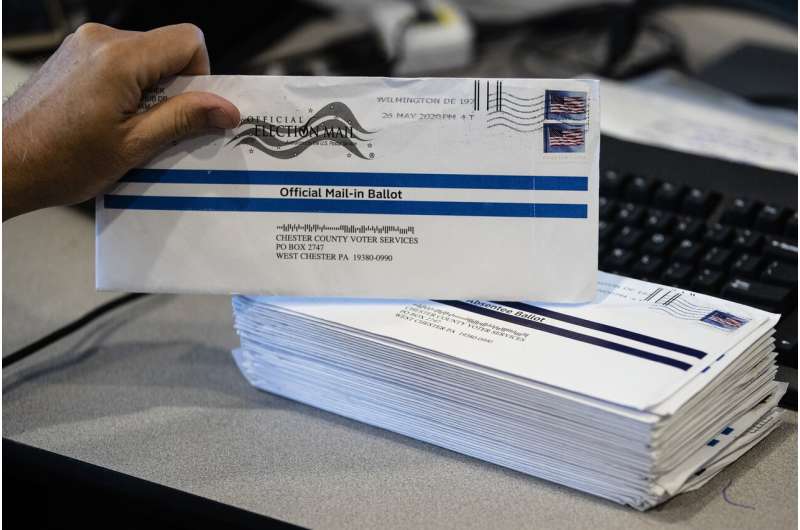In this May 28, 2020, file photo, mail-in ballots are processed at the Chester County Voter Services office in West Chester, Pa., prior to the primary election. Democrats are mounting a new effort to push back against a well-funded Republican campaign that seeks to undermine public confidence in mail-in-voting. (AP Photo/Matt Rourke, File)
Facebook said Thursday that it is working to help Americans vote by mail, including by notifying users about how to request ballots and whether the date of their state's election has changed.
The Vote By Mail notification connects Facebook users to information about how to request a ballot. It is targeted to voters in states where no excuse is needed to vote by mail or where fears of the coronavirus are accepted as a universal excuse.
"In this constantly evolving environment, we remain focused on working with election authorities to provide people with authoritative, geographically targeted voting information," Nathaniel Gleicher, Facebook's head of security policy, told the House Intelligence Committee at a hearing on election security and online disinformation.
In working to facilitate voting by mail during the pandemic, the company is stepping into politically sensitive ground. President Donald Trump and Republicans are trying to limit such voting while Democrats are pushing it to boost turnout.
The hearing also featured officials from Twitter and Google and centered on efforts by the technology companies to police the spread of disinformation, tied to both the election and COVID-19, on the platforms. Those are significant challenges in a country bracing for potentially dramatic changes in how Americans vote, with expected widespread use of the vote-by-mail creating openings to cast doubt, skepticism and even false information on the November election's results.
The hearing came as Big Tech faces increasing pressure to monitor content and to be transparent about the accuracy of information visible to users. Twitter has begun labeling tweets based on manipulated media that are attempted to confuse and mislead people, and has taken steps to prohibit paid political advertising, including by government-controlled news media entities.
The Trump administration, meanwhile, proposed this week rolling back legal protections for technology companies for material posted on their platforms.
Of particular concern heading into November are foreign influence operations, reliant on bogus social media accounts, aimed at swaying opinion. An investigation by special counsel Robert Mueller revealed a vast Russian effort to sow discord on the internet during the 2016 presidential election by playing up divisive social medias.
Facebook said that two days before the 2018 elections, it dismantled more than 100 accounts linked to the same operation. Between January and March of this year, the company says it dismantled roughly 1.7 billion accounts.
© 2020 The Associated Press. All rights reserved. This material may not be published, broadcast, rewritten or redistributed without permission.
























